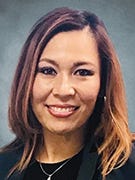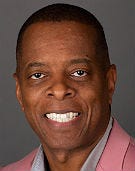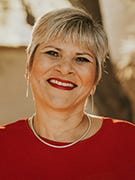DE&I Workshop: Programs Must Be Flexible and Intentional
Mentorship and allyship were examined for the contributions they can make to DE&I initiatives.

The basic tenets of any DE&I program are being flexible and being intentional. This seemed to be the consensus among the speakers at today’s DE&I workshop presented by Channel Partners. Focusing on the theme “Step In & Step Up,” the webinar took a close look at allyship and mentorship. The two topics were selected because of their popularity at the DE&I workshop Channel Futures presented in June.

Jambb’s Di Ciruolo
In the first session of the workshop, Di Ciruolo, head of inclusion at Jambb, led a panel discussion on “Allyship: The Secrets to Building More Inclusive, Innovative and Productive Teams.”
Serving on the panel for the discussion were Natasha Royer Coons, CRO of Advantix Solutions Group; Joe Rojas, CEO of RedSapiens; and Jamaal Savwoir, vice president of partner experience at Intelisys. Savwoir is also a co-founder and board member of the Xposure Inclusion & Diversity Council.
DE&I Is a Business Problem
There was 100% agreement among the group that “DE&I is a business problem and it should be treated as such.” That means applying the same processes and procedures to mitigating DE&I challenges as would be used, for example, in adopting new technology, the panel said. “How does this impact your business, your growth?”
As for allyship, the panel agreed that it had gained a new element of importance for businesses. Not that the issues of DE&I have become more pressing — they have become more visible. The massive maneuvering required to facilitate remote work during the COVID crisis not only took employees from their cubicles to their home offices, it exposed many of the DE&I issues endemic to the traditional office environment.

Intelisys’ Jamaal Savwoir

Advantix’s Natasha Royer-Coons
Savwoir noted that many black employees have said they prefer telecommuting because they no longer deal with micro-aggressions. Royer-Coons related how her company developed flexible work schedules that addressed the needs of working mothers. These and other instances of companies demonstrating much-needed flexibility illustrated how human-centric businesses could be more profitable than investor-centric businesses.
For the purposes of the discussion, allyship was defined as “when someone uses their power and privilege to advocate for others.”

RedSapiens’ Joe Rojas
Being an ally requires an individual to be informed, be intentional about lifting people up, be ready to learn and be willing to make mistakes. “You have to curate a DE&I culture with real conversations,” said Rogas. “You need to be kind. Replace micro-aggression with micro-kindness.”
Mentorship Is All About Goals

Colotraq’s Dany Bouchedid
Without goals, any mentoring program is doomed to fail. Working from this premise, Dany Bouchedid, founder and CEO of COLOTRAQ, led the second session of the DE&I workshop,
Mentorship & Giving Back: The Best DE&I Investments Leaders Can Make Today.”
Joining Bouchedid for the session were Jennifer Didier, president of Directions Training Center; Brandon Knight, vice president of advanced solutions – contact center for Telarus; and Michelle Ragusa-McBain, global lead and channel community evangelist for MSP and XaaS at Cisco. Like Intelisys’ Savoir, Knight is a co-founder and board member of the Xposure Inclusion & Diversity Council.

Cisco’s Michelle Ragusa-McBain
Ragusa-McBain stressed the importance of outlining goals for a mentoring arrangement. What are you hoping to achieve? Without goals, there is no way to track progress. Mentoring should have KPIs just like any other project.
Mentorship requires a dedication of time. For that reason, it must be important to the participants in the program, both mentor and mentee, since people are careful to make time for what they consider to be important.
‘There Is No Degree in Channel’

Telarus’ Brandon Knight
Mentoring is especially important in the channel because of its ability make people aware of careers in technology. As Knight observed, “There’s no degree in channel.”
It can also help with DE&I efforts in the channel which the panel agreed is not recruiting and equipping the right people. “If you’re looking across the table and everyone looks like you, you’re doing it wrong,” said Ragusa-McBain.
Mentoring can help attract new, diverse talent to the channel. This is especially true when mentoring is done outside the company walls and when it is done by diverse employees. “Each one reach one,” said Knight.
So what makes a good mentor? First, you should only do it because you want to, not because you think you should. If your heart’s not in it, you will…
…be doing a disservice to the mentee.

Directions Training’s Jennifer Didier
Didier outlined five characteristics of a good mentor. Be accessible. Be a good listener. Be encouraging. Be willing to share your past failures and how you learned from your mistakes. Be willing to learn from your mentee.
“We all have our superpowers,” said Ragusa-McBain. “We need to cross-pollinate those powers so we can grow. Mentoring lets us do that.
‘An Accelerator for DE&I’

Informa Tech’s Kelly Danziger
In the final session of the day, Kelly Danziger, general manager and vice president of Informa Tech, talked with Gavriella Schuster about “Why DE&I is a Leadership Imperative.”

Gavriella Schuster
Schuster recently left Microsoft after 25 years to focus full-time on promoting DE&I. “I want to be an accelerator for DE&I in the tech industry,” she said.
Ninety percent of organizations don’t have inclusion programs, according to Schuster. “A lot of leaders want to make a change but don’t know how,” she said.
Schuster works with companies to build out their DE&I strategies. She notes that while most attention is being focused on DE&I at large enterprises, smaller companies can adjust their cultures more easily. But large company or small, “It all comes down to the leaders,” she said.
On her website, Schuster outlines the four simple actions that anyone can take to make a difference: connect, outreach, mentor and empower. In her DE&I workshop discussion, she rounded up the conversation by outlining the six elements of allies: advocate, listen, lift, include, elevate and sponsor.
Did you miss the live presentation of the workshop? No problem. It’s available on demand. Just click hereto register. |
Want to contact the author directly about this story? Have ideas for a follow-up article? Email Buffy Naylor or connect with her on LinkedIn. |
About the Author
You May Also Like


